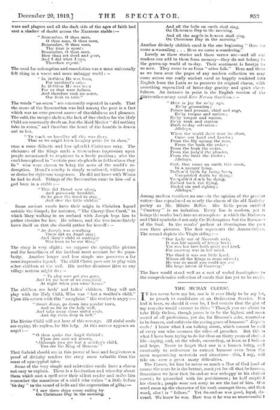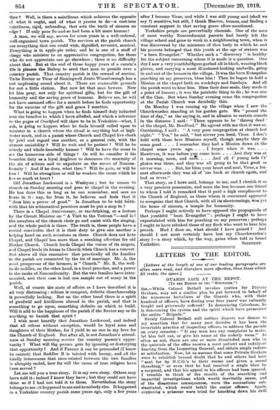THE HUMAN CLERIC.
IT has never been my lot, nor is it ever likely to be my lot, to preach to candidates at an Ordination Service. But had it been, or should it ever be, I feel certain that the gist of my remarks would amount to this : " Though you are about to take Holy Orders, though yours is to be the highest and most sacred of all professions, yet do, for Heaven's sake, remember to be human, and cultivate the saving grace of humour." Expri10 creole I know what I am talking about, which cannot be stud of every one who assumes the office of preacher. But this is what I have been trying to do for close on thirty years of elerieal life—trying, and, on the whole, succeeding, at least so I believe and hope. Never to forget that one is a human being, and constantly to endeavour to extract 'humour even from the most unpromising materials and situations—this, I say, will tide one over a great many difficulties.
The Parson, let him be never so much a Man of God (and of course the more he is the better), must yet for all that be human. Sometimes we hear that So-and-so was unhappy in his clerical career ; he quarrelled with his parishioners ; he half emptied his church ; people were not sorry to see the last of him. One word sums up the character of his work amongst them, and that word, alas ! is " failure." Yet So-and-so was good, loyal, do- . voted.. We know he was. How was it ho was so unsuccessful ? How? Well, is there a saintliness which achieves the opposite of what it ought, and of what it yearns to do—a cast-iron saintliness, rigid, unbending, that sets the teeth of sinners on edge ? If only poor So-and-so had been a bit more human!
A man, we will say, serves for some years in a well-ordered, well-organized town parish. The services at the parish church are everything that one could wish, dignified, reverent, musical.
Everything is in apple-pie order, and he is one of a staff of clergy who minister to an appreciative congregation, for those who do not appreciate can go elsewhere ; there is no difficulty about that. But at the end of those happy years of a curate's life it pleases the Bishop to send that man to preside over a
country parish. That country parish is the reward of service. To be Rector or Vicar of Sinningwell Juxta Worseborough has a not unpleasing sound about it. There are reasonable grounds for not a little elation. But now let that man beware. Now let him pray, not only for spiritual gifts, but for the gift of
humanity and the saving grace of humour. Believe me, he will not have assumed office for a month before he finds opportunity for the exercise of the gift and grace I mention.
What is going to happen when he finds himself duly inducted Into the benefice to which I have alluded, and which a reference
to the pages of Crockford will show to be in Yorkshire—what, I ask, is going to happen when he finds himself called upon to minister in a church where the ritual is anything but at high- water mark, and in a parish where Church and Chapel live cheek by jowl and regard one another, as a general rule, with the utmost amiability ? Will he wait and be patient ? Will he be utterly and whole-heartedly human ? Will he have the sense to see the humorous side of things ? Or will he consider it his bounden duty as a loyal Anglican to denounce the enormity of the sin of schism and to expatiate on the errors of Noncon- formity ? And if he does, what then ? Will he gain, or will he lose ? Will he strengthen or will he weaken the cause which he has so much at heart ?
Old Jonathan Lockwood is a Wesleyan ; but he comes to church on Sunday morning and goes to chapel in the evening. He has done this as long as he can remember, and sees no harm in it : nay, far from it, he believes and feels that it " does him a power of good." Is Jonathan to be told foith- with that his schismatical practices must be put a stop to ? There is a Chapel Anniversary, or tea-drinking, or a lecture by the Circuit Minister on " A Visit to the Vatican "—and lo ! the members of the church choir go and assist with the singing, and the whole parish is there. The truth is, these people have a rooted conviction that it is their duty to give one another a helping hand on such occasions as these. Church does not hate Chapel, and Chapel has more than a sneaking affection for old Mother Church. Church lends Chapel the voices of its singers, and Chapel lends its forms to Church when Church has a concert. But above all this remember that practically all the families in the parish are connected by the tie of marriage. Mr. A, the most prosperous of the farmers, is " Church." Mr. B, the well- to-do saddler, on the other hand, is a local preacher, and a power in the ranks of Nonconformity. But the two families have inter- married, and their case is but one sample out of many in the parish.
Well, of course the state of affairs as I have described it is all very distressing : schism is rampant, definite ohurchmanship is powerfully lacking. But on the other hand there is a spirit of goodwill and kindliness abroad in the parish, and that is something to go upon, something definite on which to build. Will it add to the happiness of the parish if the Rector say or do anything to banish that spirit ?
I wish most heartily that Jonathan Lockwood, and indeed that all others without exception, would be loyal sons and daughters of their Mother, for I yield to no one in my love for the Church of England. But after all, is not Jonathan's attend- ance at Sunday morning service the country parson's oppor- tunity ? What will tha parson gain by ignoring or destroying that opportunity ? And if Farmer A can be persuaded (I know he cannot) that Saddler B is tainted with heresy, and all the kindly intercourse that once existed between the two families is abruptly ended, how far will the cause of true religion have been served ?
Let me tell you a true story. It is my own story. Others may have told it : indeed I know they have ; but they could not have done so if I had not told it to them. Nevertheless the story belongs to me : it happened to me and to nobody else. It happened in a Yorkshire country parish some years ago, only a few years after I became Vicar, and while I was still young and (shall we say ?) sensitive, but still, I thank Heaven, human, and finding a constant support in that saving grace afore-mentioned.
Yorkshire people are proverbially clannish. One of the sons of most worthy Nonconformist parents had barely left the village school and gone to work in a neighbouring town, when it was discovered by the ministers of that body to which he and his parents belonged that this youth at the age of sixteen was " a born Evangelist." Whether such a " discovery " is healthy for the subject concerning whom it is made is a question. One day I saw a very youthful figure garbed all in black, wearing black gloves, and carrying a most ill-natured-looking umbrella, going in and out of the houses in the village. It was the born Evangelist poaching on my preserves, bless him ! Then he began to hold a Mission at the chapel both on weekdays and Sundays. And all the parish went to hear him. Bless their dear souls, they made it a point of honour ; it was the patriotic thing to do ; he was one of the Clan. But when Sunday evening came the congregation at the Parish Church was decidedly thin.
On Monday I was coining up the village when I saw the Churchwarden standing at his garden gate. We " passed the
time of day," as the saying is, and in allusion to certain sounds in the distance I said : " There appears to be ' throng deed ' at the chapel, Mr. Bradford." He agreed with me that it was so.
Continuing, I said: " A very poor congregation at church last
night." " Yes," he said, " but nivver you heed, Vicar. I don't hold with these here Missions myself, though maybe they do
some good. . . . I remember they had a Mission down at the chapel some years ago. . . . I forget when it was. . . . Howivver, it was before you come here. . . . And they was at it morning, noon, and nett. . . . And all t' young lads i't' plaice was there, and they was all going to be that good as nivver wee. . . . But, for bless your heart and soul, Vicar, a fot- nest afterwards they was all of 'em back at church again, and bad as ivver."
That story, as I have said, belongs to me, and I cherish it as a very precious possession, and none the less because one friend to whom I told it remarked that it paid a high compliment to the Church of England, as those whom it concerned appeared to recognize that that Church, with all its shortcomings, was yet the home of sinners, a temple for humanity.
Perhaps I ought actively to have opposed the propaganda of that youthful " born Evangelist " : perhaps I ought to have expostulated with him for poaching on my preserves : perhaps I ought to have rebuked those of my flock who went to hear him preach. Had I done so, what should I have gained ? And should I not most certainly have lost my Churchwarden's story ?—a story which, by the way, gains when told in broad
Yorkshire. SPINTEXT.







































 Previous page
Previous page